Talent Management: A Key Component of HRM for Organizational Success
VerifiedAdded on 2022/12/29
|37
|8222
|92
Report
AI Summary
This report evaluates effective talent management strategies that contribute to organizational success, specifically within the UK hospitality sector, with a case study on Hilton. The study investigates various talent management strategies used by HRM, including attracting, hiring, training, developing, and retaining employees. It explores the impact of these practices on organizational success, identifies alternative strategies for performance improvement, and examines the role of talent management in the hospitality industry. The research employs a qualitative approach, using secondary data from literature reviews and primary data through interviews with Hilton employees. The report addresses research questions about talent management strategies, their impact on success, alternative approaches, the role in hospitality, Hilton's practices, and recommendations for long-term success. The findings, based on thematic perception tests, offer insights into the effectiveness of talent management practices and provide recommendations for Hilton and other hospitality companies to enhance organizational performance and employee retention.
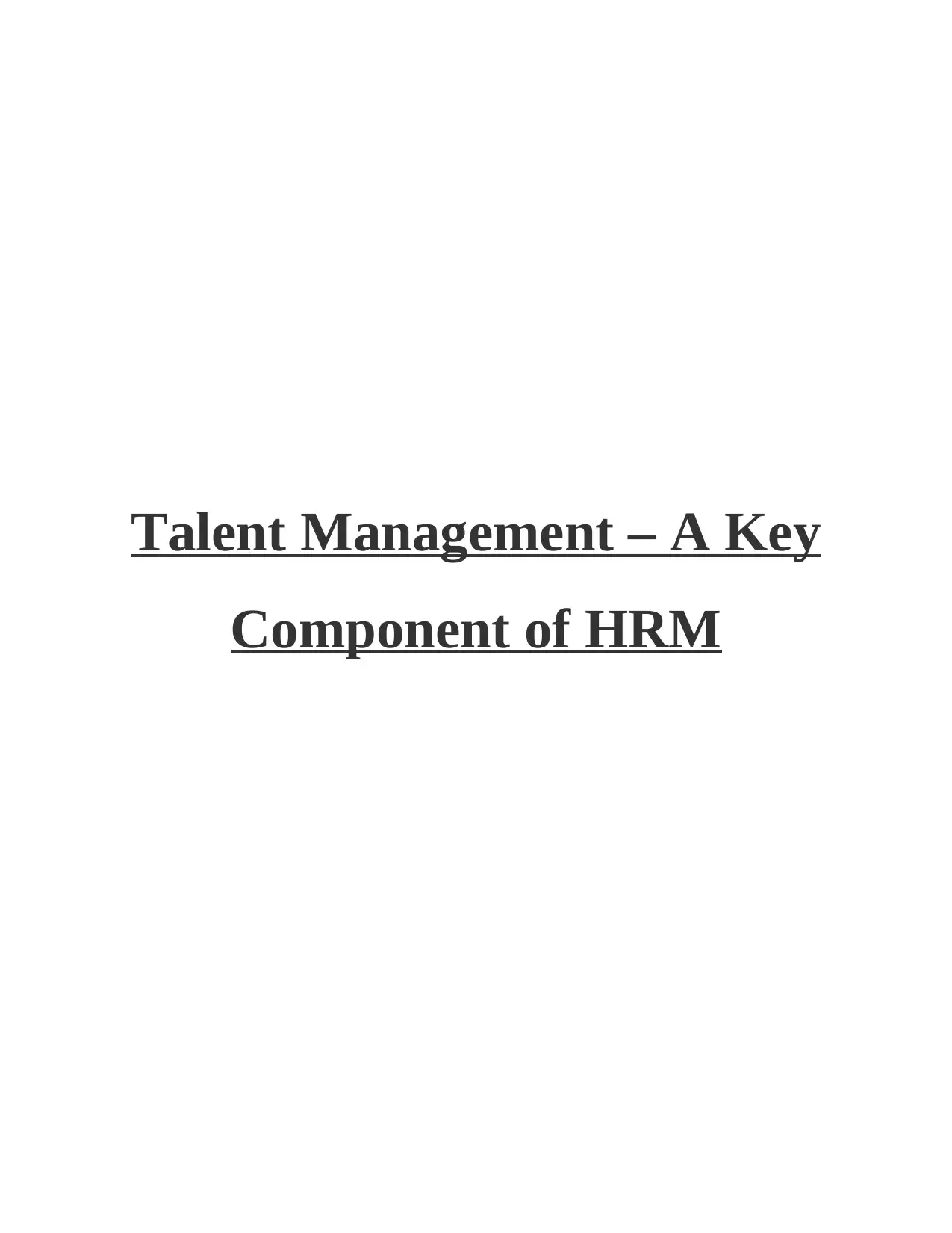
Talent Management – A Key
Component of HRM
Component of HRM
Paraphrase This Document
Need a fresh take? Get an instant paraphrase of this document with our AI Paraphraser
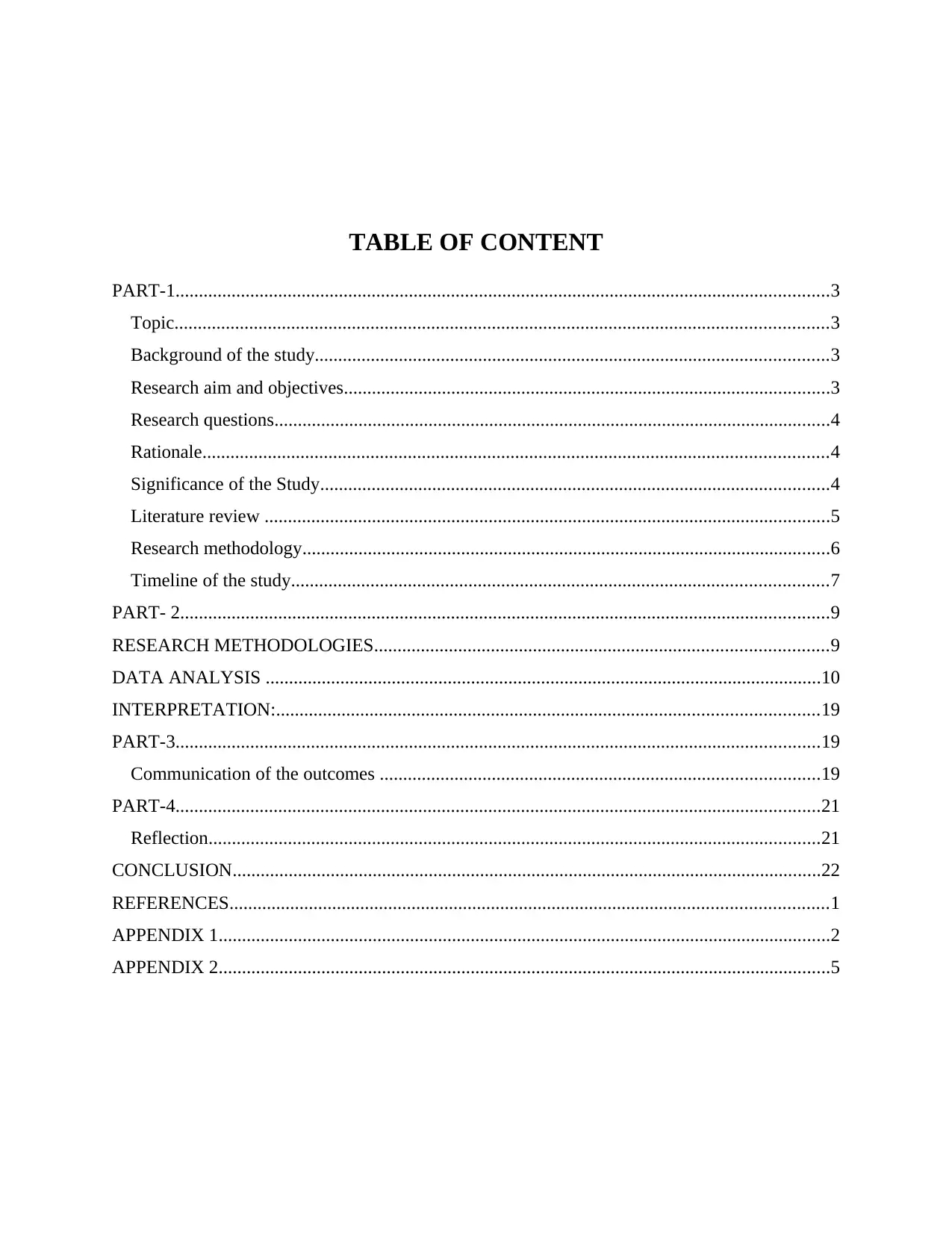
TABLE OF CONTENT
PART-1............................................................................................................................................3
Topic............................................................................................................................................3
Background of the study..............................................................................................................3
Research aim and objectives........................................................................................................3
Research questions.......................................................................................................................4
Rationale......................................................................................................................................4
Significance of the Study.............................................................................................................4
Literature review .........................................................................................................................5
Research methodology.................................................................................................................6
Timeline of the study...................................................................................................................7
PART- 2...........................................................................................................................................9
RESEARCH METHODOLOGIES.................................................................................................9
DATA ANALYSIS .......................................................................................................................10
INTERPRETATION:....................................................................................................................19
PART-3..........................................................................................................................................19
Communication of the outcomes ..............................................................................................19
PART-4..........................................................................................................................................21
Reflection...................................................................................................................................21
CONCLUSION..............................................................................................................................22
REFERENCES................................................................................................................................1
APPENDIX 1...................................................................................................................................2
APPENDIX 2...................................................................................................................................5
PART-1............................................................................................................................................3
Topic............................................................................................................................................3
Background of the study..............................................................................................................3
Research aim and objectives........................................................................................................3
Research questions.......................................................................................................................4
Rationale......................................................................................................................................4
Significance of the Study.............................................................................................................4
Literature review .........................................................................................................................5
Research methodology.................................................................................................................6
Timeline of the study...................................................................................................................7
PART- 2...........................................................................................................................................9
RESEARCH METHODOLOGIES.................................................................................................9
DATA ANALYSIS .......................................................................................................................10
INTERPRETATION:....................................................................................................................19
PART-3..........................................................................................................................................19
Communication of the outcomes ..............................................................................................19
PART-4..........................................................................................................................................21
Reflection...................................................................................................................................21
CONCLUSION..............................................................................................................................22
REFERENCES................................................................................................................................1
APPENDIX 1...................................................................................................................................2
APPENDIX 2...................................................................................................................................5
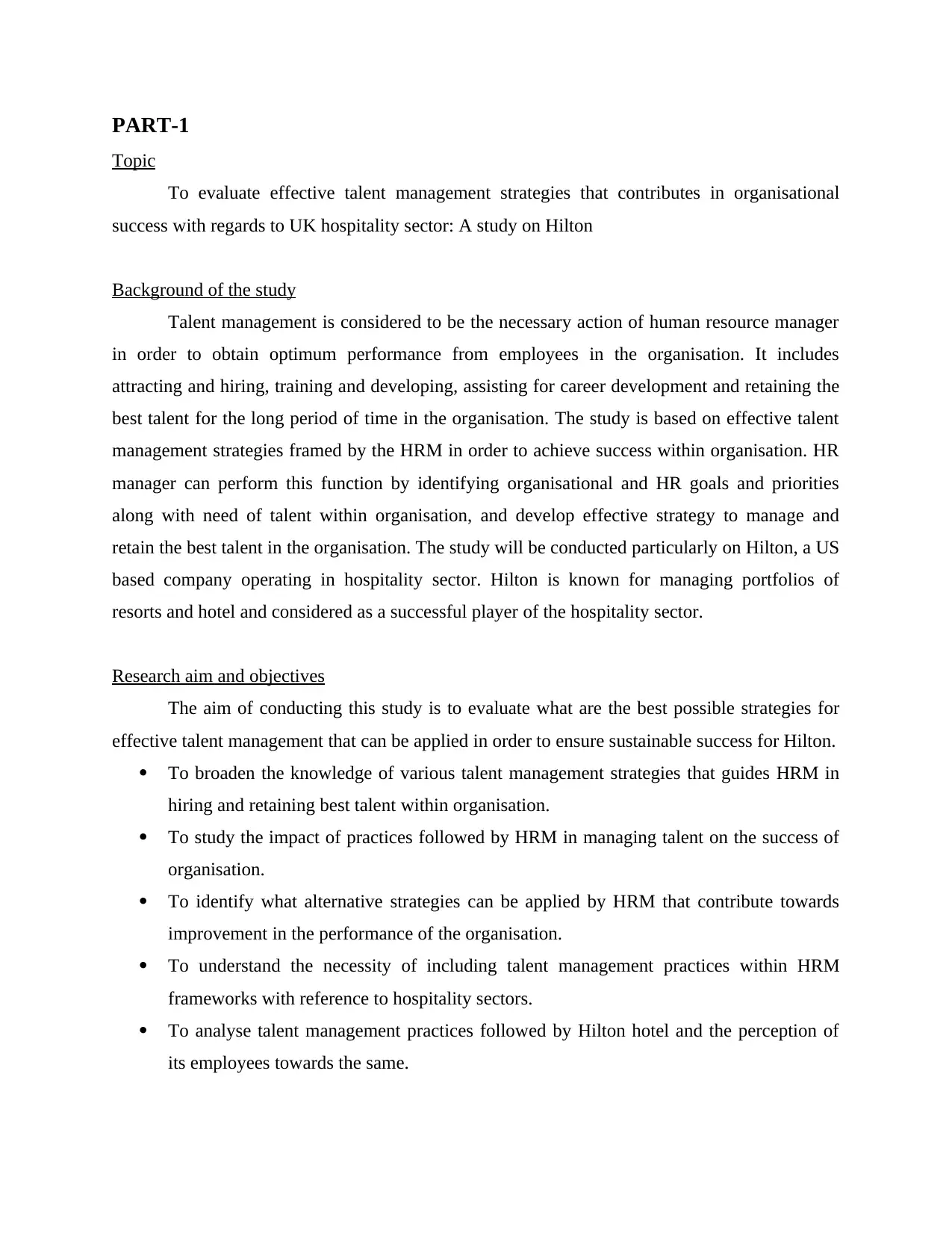
PART-1
Topic
To evaluate effective talent management strategies that contributes in organisational
success with regards to UK hospitality sector: A study on Hilton
Background of the study
Talent management is considered to be the necessary action of human resource manager
in order to obtain optimum performance from employees in the organisation. It includes
attracting and hiring, training and developing, assisting for career development and retaining the
best talent for the long period of time in the organisation. The study is based on effective talent
management strategies framed by the HRM in order to achieve success within organisation. HR
manager can perform this function by identifying organisational and HR goals and priorities
along with need of talent within organisation, and develop effective strategy to manage and
retain the best talent in the organisation. The study will be conducted particularly on Hilton, a US
based company operating in hospitality sector. Hilton is known for managing portfolios of
resorts and hotel and considered as a successful player of the hospitality sector.
Research aim and objectives
The aim of conducting this study is to evaluate what are the best possible strategies for
effective talent management that can be applied in order to ensure sustainable success for Hilton.
To broaden the knowledge of various talent management strategies that guides HRM in
hiring and retaining best talent within organisation.
To study the impact of practices followed by HRM in managing talent on the success of
organisation.
To identify what alternative strategies can be applied by HRM that contribute towards
improvement in the performance of the organisation.
To understand the necessity of including talent management practices within HRM
frameworks with reference to hospitality sectors.
To analyse talent management practices followed by Hilton hotel and the perception of
its employees towards the same.
Topic
To evaluate effective talent management strategies that contributes in organisational
success with regards to UK hospitality sector: A study on Hilton
Background of the study
Talent management is considered to be the necessary action of human resource manager
in order to obtain optimum performance from employees in the organisation. It includes
attracting and hiring, training and developing, assisting for career development and retaining the
best talent for the long period of time in the organisation. The study is based on effective talent
management strategies framed by the HRM in order to achieve success within organisation. HR
manager can perform this function by identifying organisational and HR goals and priorities
along with need of talent within organisation, and develop effective strategy to manage and
retain the best talent in the organisation. The study will be conducted particularly on Hilton, a US
based company operating in hospitality sector. Hilton is known for managing portfolios of
resorts and hotel and considered as a successful player of the hospitality sector.
Research aim and objectives
The aim of conducting this study is to evaluate what are the best possible strategies for
effective talent management that can be applied in order to ensure sustainable success for Hilton.
To broaden the knowledge of various talent management strategies that guides HRM in
hiring and retaining best talent within organisation.
To study the impact of practices followed by HRM in managing talent on the success of
organisation.
To identify what alternative strategies can be applied by HRM that contribute towards
improvement in the performance of the organisation.
To understand the necessity of including talent management practices within HRM
frameworks with reference to hospitality sectors.
To analyse talent management practices followed by Hilton hotel and the perception of
its employees towards the same.
⊘ This is a preview!⊘
Do you want full access?
Subscribe today to unlock all pages.

Trusted by 1+ million students worldwide
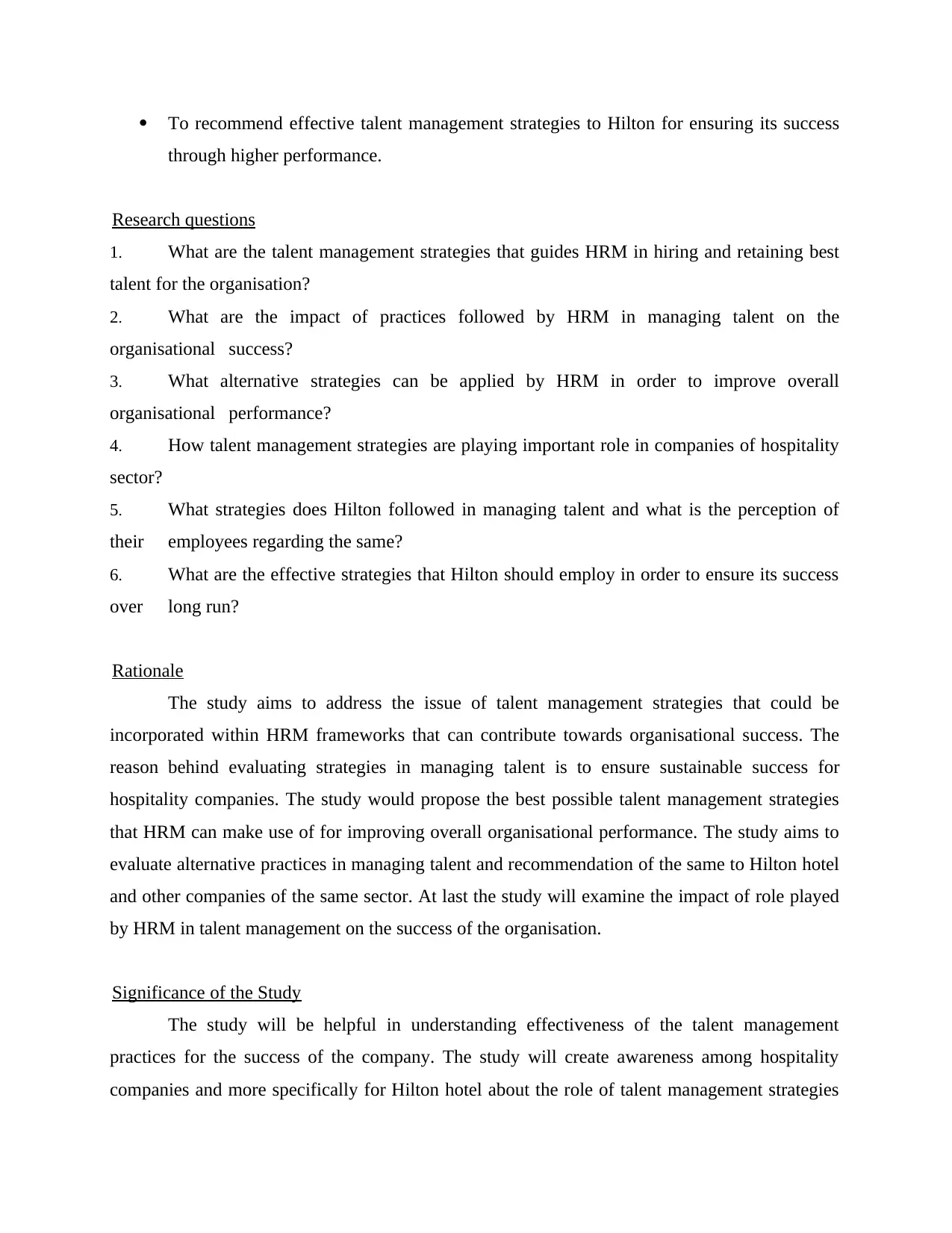
To recommend effective talent management strategies to Hilton for ensuring its success
through higher performance.
Research questions
1. What are the talent management strategies that guides HRM in hiring and retaining best
talent for the organisation?
2. What are the impact of practices followed by HRM in managing talent on the
organisational success?
3. What alternative strategies can be applied by HRM in order to improve overall
organisational performance?
4. How talent management strategies are playing important role in companies of hospitality
sector?
5. What strategies does Hilton followed in managing talent and what is the perception of
their employees regarding the same?
6. What are the effective strategies that Hilton should employ in order to ensure its success
over long run?
Rationale
The study aims to address the issue of talent management strategies that could be
incorporated within HRM frameworks that can contribute towards organisational success. The
reason behind evaluating strategies in managing talent is to ensure sustainable success for
hospitality companies. The study would propose the best possible talent management strategies
that HRM can make use of for improving overall organisational performance. The study aims to
evaluate alternative practices in managing talent and recommendation of the same to Hilton hotel
and other companies of the same sector. At last the study will examine the impact of role played
by HRM in talent management on the success of the organisation.
Significance of the Study
The study will be helpful in understanding effectiveness of the talent management
practices for the success of the company. The study will create awareness among hospitality
companies and more specifically for Hilton hotel about the role of talent management strategies
through higher performance.
Research questions
1. What are the talent management strategies that guides HRM in hiring and retaining best
talent for the organisation?
2. What are the impact of practices followed by HRM in managing talent on the
organisational success?
3. What alternative strategies can be applied by HRM in order to improve overall
organisational performance?
4. How talent management strategies are playing important role in companies of hospitality
sector?
5. What strategies does Hilton followed in managing talent and what is the perception of
their employees regarding the same?
6. What are the effective strategies that Hilton should employ in order to ensure its success
over long run?
Rationale
The study aims to address the issue of talent management strategies that could be
incorporated within HRM frameworks that can contribute towards organisational success. The
reason behind evaluating strategies in managing talent is to ensure sustainable success for
hospitality companies. The study would propose the best possible talent management strategies
that HRM can make use of for improving overall organisational performance. The study aims to
evaluate alternative practices in managing talent and recommendation of the same to Hilton hotel
and other companies of the same sector. At last the study will examine the impact of role played
by HRM in talent management on the success of the organisation.
Significance of the Study
The study will be helpful in understanding effectiveness of the talent management
practices for the success of the company. The study will create awareness among hospitality
companies and more specifically for Hilton hotel about the role of talent management strategies
Paraphrase This Document
Need a fresh take? Get an instant paraphrase of this document with our AI Paraphraser
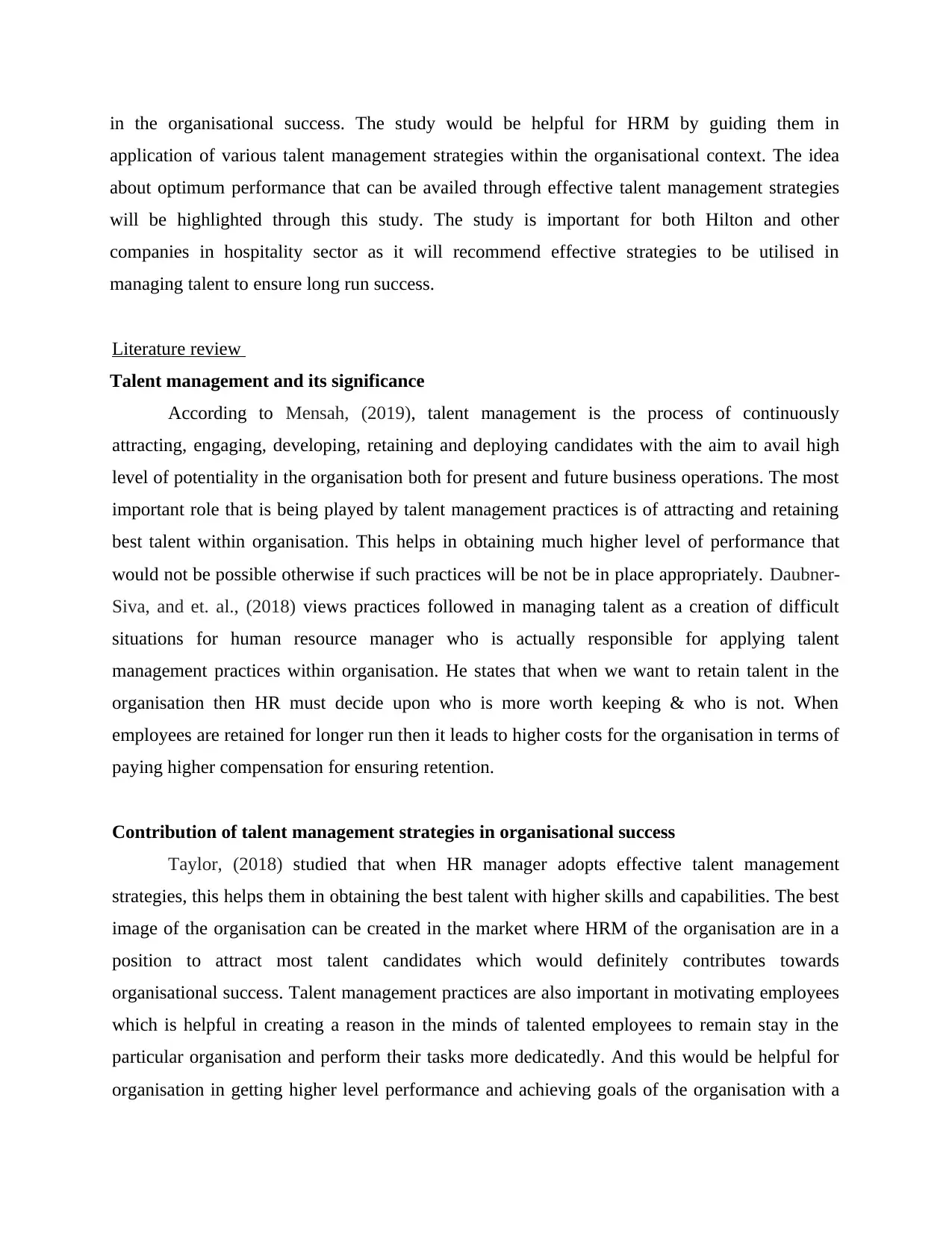
in the organisational success. The study would be helpful for HRM by guiding them in
application of various talent management strategies within the organisational context. The idea
about optimum performance that can be availed through effective talent management strategies
will be highlighted through this study. The study is important for both Hilton and other
companies in hospitality sector as it will recommend effective strategies to be utilised in
managing talent to ensure long run success.
Literature review
Talent management and its significance
According to Mensah, (2019), talent management is the process of continuously
attracting, engaging, developing, retaining and deploying candidates with the aim to avail high
level of potentiality in the organisation both for present and future business operations. The most
important role that is being played by talent management practices is of attracting and retaining
best talent within organisation. This helps in obtaining much higher level of performance that
would not be possible otherwise if such practices will be not be in place appropriately. Daubner-
Siva, and et. al., (2018) views practices followed in managing talent as a creation of difficult
situations for human resource manager who is actually responsible for applying talent
management practices within organisation. He states that when we want to retain talent in the
organisation then HR must decide upon who is more worth keeping & who is not. When
employees are retained for longer run then it leads to higher costs for the organisation in terms of
paying higher compensation for ensuring retention.
Contribution of talent management strategies in organisational success
Taylor, (2018) studied that when HR manager adopts effective talent management
strategies, this helps them in obtaining the best talent with higher skills and capabilities. The best
image of the organisation can be created in the market where HRM of the organisation are in a
position to attract most talent candidates which would definitely contributes towards
organisational success. Talent management practices are also important in motivating employees
which is helpful in creating a reason in the minds of talented employees to remain stay in the
particular organisation and perform their tasks more dedicatedly. And this would be helpful for
organisation in getting higher level performance and achieving goals of the organisation with a
application of various talent management strategies within the organisational context. The idea
about optimum performance that can be availed through effective talent management strategies
will be highlighted through this study. The study is important for both Hilton and other
companies in hospitality sector as it will recommend effective strategies to be utilised in
managing talent to ensure long run success.
Literature review
Talent management and its significance
According to Mensah, (2019), talent management is the process of continuously
attracting, engaging, developing, retaining and deploying candidates with the aim to avail high
level of potentiality in the organisation both for present and future business operations. The most
important role that is being played by talent management practices is of attracting and retaining
best talent within organisation. This helps in obtaining much higher level of performance that
would not be possible otherwise if such practices will be not be in place appropriately. Daubner-
Siva, and et. al., (2018) views practices followed in managing talent as a creation of difficult
situations for human resource manager who is actually responsible for applying talent
management practices within organisation. He states that when we want to retain talent in the
organisation then HR must decide upon who is more worth keeping & who is not. When
employees are retained for longer run then it leads to higher costs for the organisation in terms of
paying higher compensation for ensuring retention.
Contribution of talent management strategies in organisational success
Taylor, (2018) studied that when HR manager adopts effective talent management
strategies, this helps them in obtaining the best talent with higher skills and capabilities. The best
image of the organisation can be created in the market where HRM of the organisation are in a
position to attract most talent candidates which would definitely contributes towards
organisational success. Talent management practices are also important in motivating employees
which is helpful in creating a reason in the minds of talented employees to remain stay in the
particular organisation and perform their tasks more dedicatedly. And this would be helpful for
organisation in getting higher level performance and achieving goals of the organisation with a
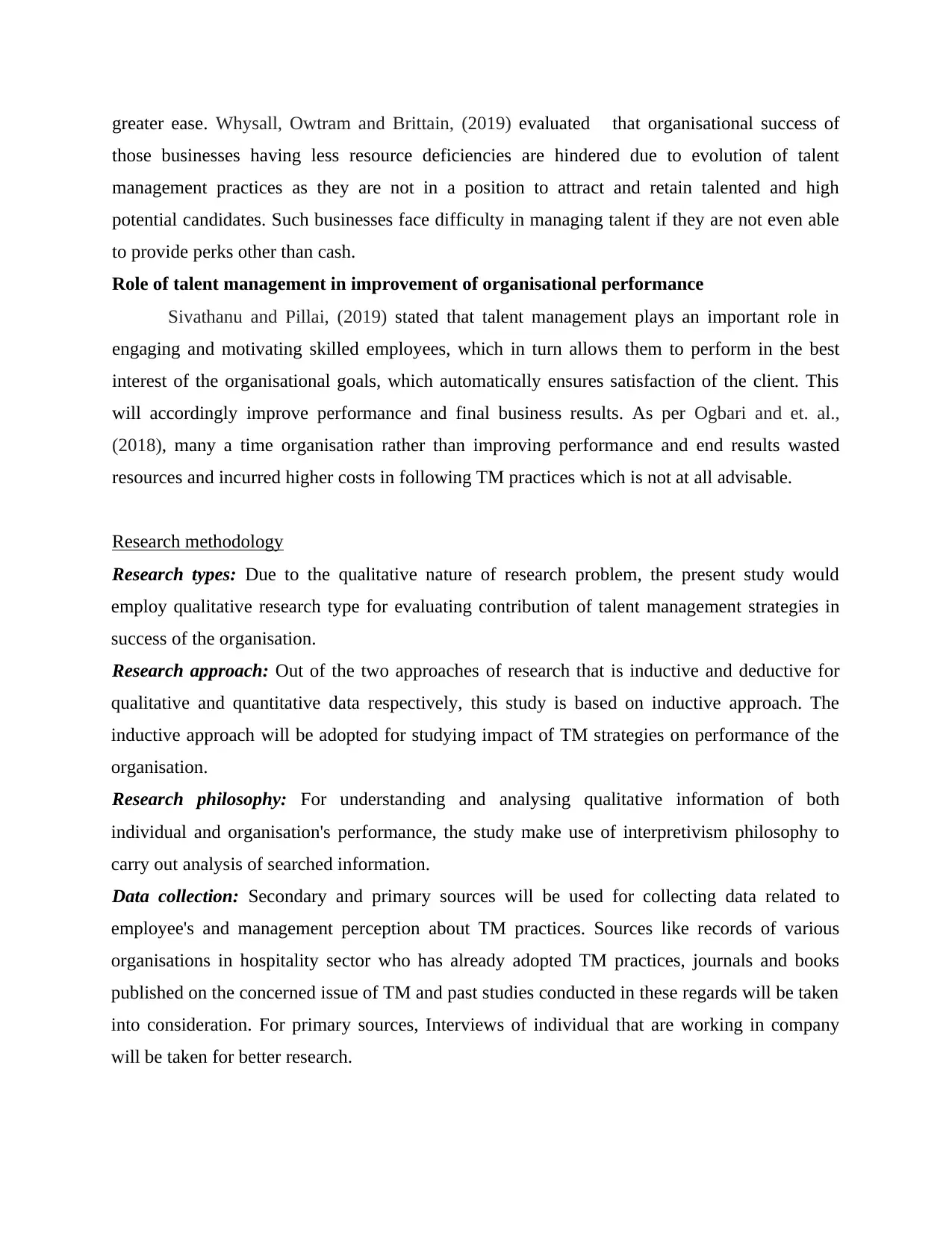
greater ease. Whysall, Owtram and Brittain, (2019) evaluated that organisational success of
those businesses having less resource deficiencies are hindered due to evolution of talent
management practices as they are not in a position to attract and retain talented and high
potential candidates. Such businesses face difficulty in managing talent if they are not even able
to provide perks other than cash.
Role of talent management in improvement of organisational performance
Sivathanu and Pillai, (2019) stated that talent management plays an important role in
engaging and motivating skilled employees, which in turn allows them to perform in the best
interest of the organisational goals, which automatically ensures satisfaction of the client. This
will accordingly improve performance and final business results. As per Ogbari and et. al.,
(2018), many a time organisation rather than improving performance and end results wasted
resources and incurred higher costs in following TM practices which is not at all advisable.
Research methodology
Research types: Due to the qualitative nature of research problem, the present study would
employ qualitative research type for evaluating contribution of talent management strategies in
success of the organisation.
Research approach: Out of the two approaches of research that is inductive and deductive for
qualitative and quantitative data respectively, this study is based on inductive approach. The
inductive approach will be adopted for studying impact of TM strategies on performance of the
organisation.
Research philosophy: For understanding and analysing qualitative information of both
individual and organisation's performance, the study make use of interpretivism philosophy to
carry out analysis of searched information.
Data collection: Secondary and primary sources will be used for collecting data related to
employee's and management perception about TM practices. Sources like records of various
organisations in hospitality sector who has already adopted TM practices, journals and books
published on the concerned issue of TM and past studies conducted in these regards will be taken
into consideration. For primary sources, Interviews of individual that are working in company
will be taken for better research.
those businesses having less resource deficiencies are hindered due to evolution of talent
management practices as they are not in a position to attract and retain talented and high
potential candidates. Such businesses face difficulty in managing talent if they are not even able
to provide perks other than cash.
Role of talent management in improvement of organisational performance
Sivathanu and Pillai, (2019) stated that talent management plays an important role in
engaging and motivating skilled employees, which in turn allows them to perform in the best
interest of the organisational goals, which automatically ensures satisfaction of the client. This
will accordingly improve performance and final business results. As per Ogbari and et. al.,
(2018), many a time organisation rather than improving performance and end results wasted
resources and incurred higher costs in following TM practices which is not at all advisable.
Research methodology
Research types: Due to the qualitative nature of research problem, the present study would
employ qualitative research type for evaluating contribution of talent management strategies in
success of the organisation.
Research approach: Out of the two approaches of research that is inductive and deductive for
qualitative and quantitative data respectively, this study is based on inductive approach. The
inductive approach will be adopted for studying impact of TM strategies on performance of the
organisation.
Research philosophy: For understanding and analysing qualitative information of both
individual and organisation's performance, the study make use of interpretivism philosophy to
carry out analysis of searched information.
Data collection: Secondary and primary sources will be used for collecting data related to
employee's and management perception about TM practices. Sources like records of various
organisations in hospitality sector who has already adopted TM practices, journals and books
published on the concerned issue of TM and past studies conducted in these regards will be taken
into consideration. For primary sources, Interviews of individual that are working in company
will be taken for better research.
⊘ This is a preview!⊘
Do you want full access?
Subscribe today to unlock all pages.

Trusted by 1+ million students worldwide
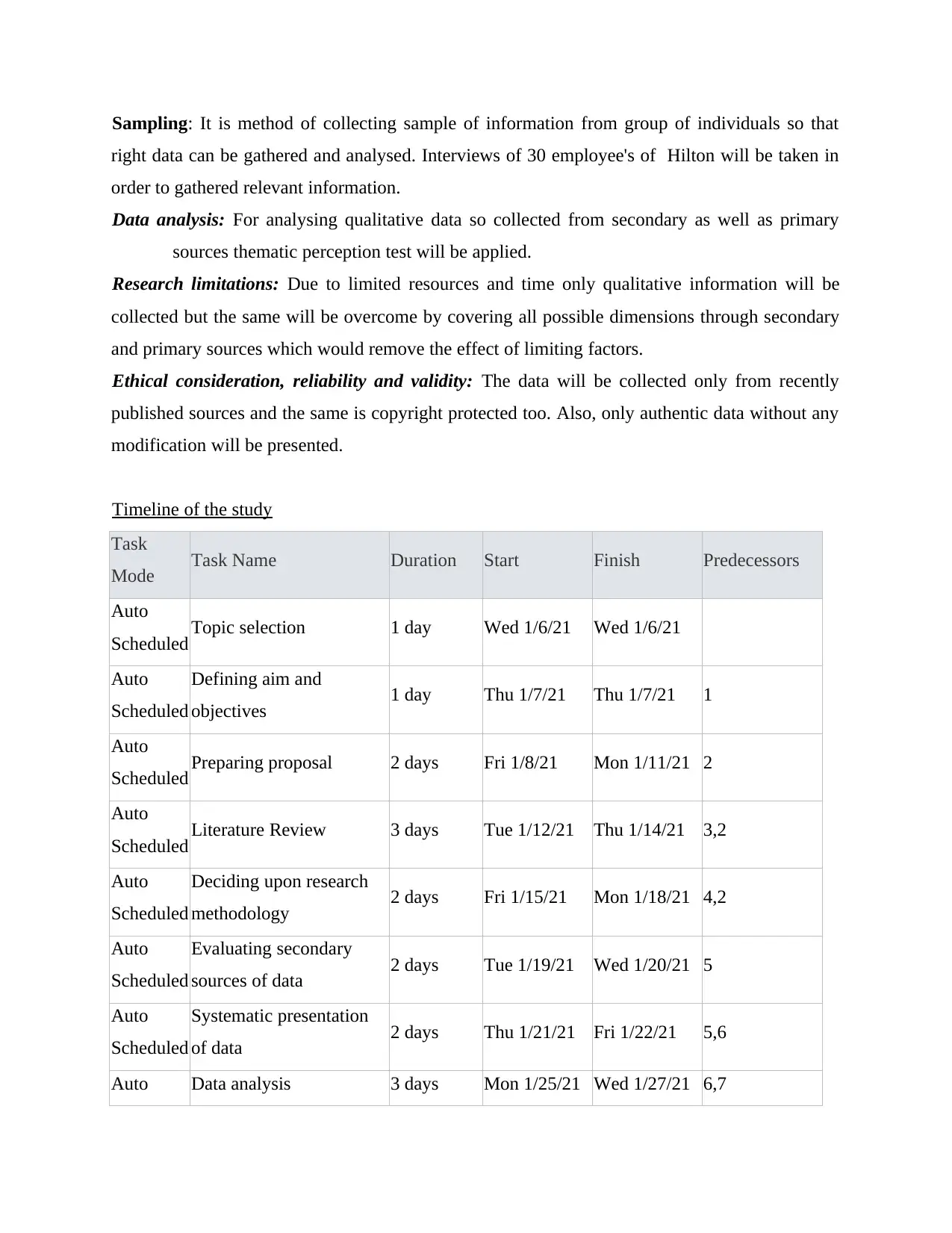
Sampling: It is method of collecting sample of information from group of individuals so that
right data can be gathered and analysed. Interviews of 30 employee's of Hilton will be taken in
order to gathered relevant information.
Data analysis: For analysing qualitative data so collected from secondary as well as primary
sources thematic perception test will be applied.
Research limitations: Due to limited resources and time only qualitative information will be
collected but the same will be overcome by covering all possible dimensions through secondary
and primary sources which would remove the effect of limiting factors.
Ethical consideration, reliability and validity: The data will be collected only from recently
published sources and the same is copyright protected too. Also, only authentic data without any
modification will be presented.
Timeline of the study
Task
Mode Task Name Duration Start Finish Predecessors
Auto
Scheduled Topic selection 1 day Wed 1/6/21 Wed 1/6/21
Auto
Scheduled
Defining aim and
objectives 1 day Thu 1/7/21 Thu 1/7/21 1
Auto
Scheduled Preparing proposal 2 days Fri 1/8/21 Mon 1/11/21 2
Auto
Scheduled Literature Review 3 days Tue 1/12/21 Thu 1/14/21 3,2
Auto
Scheduled
Deciding upon research
methodology 2 days Fri 1/15/21 Mon 1/18/21 4,2
Auto
Scheduled
Evaluating secondary
sources of data 2 days Tue 1/19/21 Wed 1/20/21 5
Auto
Scheduled
Systematic presentation
of data 2 days Thu 1/21/21 Fri 1/22/21 5,6
Auto Data analysis 3 days Mon 1/25/21 Wed 1/27/21 6,7
right data can be gathered and analysed. Interviews of 30 employee's of Hilton will be taken in
order to gathered relevant information.
Data analysis: For analysing qualitative data so collected from secondary as well as primary
sources thematic perception test will be applied.
Research limitations: Due to limited resources and time only qualitative information will be
collected but the same will be overcome by covering all possible dimensions through secondary
and primary sources which would remove the effect of limiting factors.
Ethical consideration, reliability and validity: The data will be collected only from recently
published sources and the same is copyright protected too. Also, only authentic data without any
modification will be presented.
Timeline of the study
Task
Mode Task Name Duration Start Finish Predecessors
Auto
Scheduled Topic selection 1 day Wed 1/6/21 Wed 1/6/21
Auto
Scheduled
Defining aim and
objectives 1 day Thu 1/7/21 Thu 1/7/21 1
Auto
Scheduled Preparing proposal 2 days Fri 1/8/21 Mon 1/11/21 2
Auto
Scheduled Literature Review 3 days Tue 1/12/21 Thu 1/14/21 3,2
Auto
Scheduled
Deciding upon research
methodology 2 days Fri 1/15/21 Mon 1/18/21 4,2
Auto
Scheduled
Evaluating secondary
sources of data 2 days Tue 1/19/21 Wed 1/20/21 5
Auto
Scheduled
Systematic presentation
of data 2 days Thu 1/21/21 Fri 1/22/21 5,6
Auto Data analysis 3 days Mon 1/25/21 Wed 1/27/21 6,7
Paraphrase This Document
Need a fresh take? Get an instant paraphrase of this document with our AI Paraphraser
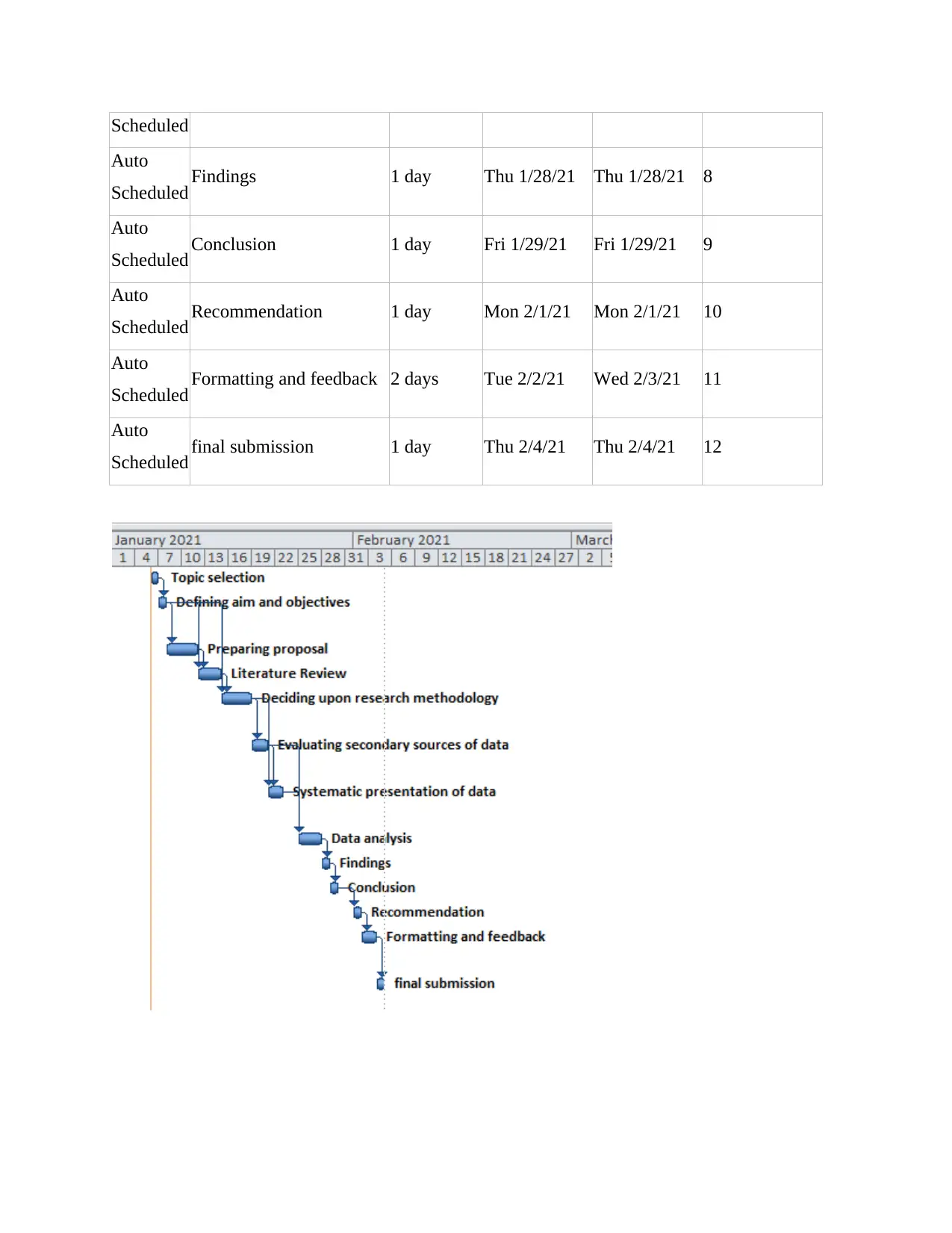
Scheduled
Auto
Scheduled Findings 1 day Thu 1/28/21 Thu 1/28/21 8
Auto
Scheduled Conclusion 1 day Fri 1/29/21 Fri 1/29/21 9
Auto
Scheduled Recommendation 1 day Mon 2/1/21 Mon 2/1/21 10
Auto
Scheduled Formatting and feedback 2 days Tue 2/2/21 Wed 2/3/21 11
Auto
Scheduled final submission 1 day Thu 2/4/21 Thu 2/4/21 12
Auto
Scheduled Findings 1 day Thu 1/28/21 Thu 1/28/21 8
Auto
Scheduled Conclusion 1 day Fri 1/29/21 Fri 1/29/21 9
Auto
Scheduled Recommendation 1 day Mon 2/1/21 Mon 2/1/21 10
Auto
Scheduled Formatting and feedback 2 days Tue 2/2/21 Wed 2/3/21 11
Auto
Scheduled final submission 1 day Thu 2/4/21 Thu 2/4/21 12

⊘ This is a preview!⊘
Do you want full access?
Subscribe today to unlock all pages.

Trusted by 1+ million students worldwide
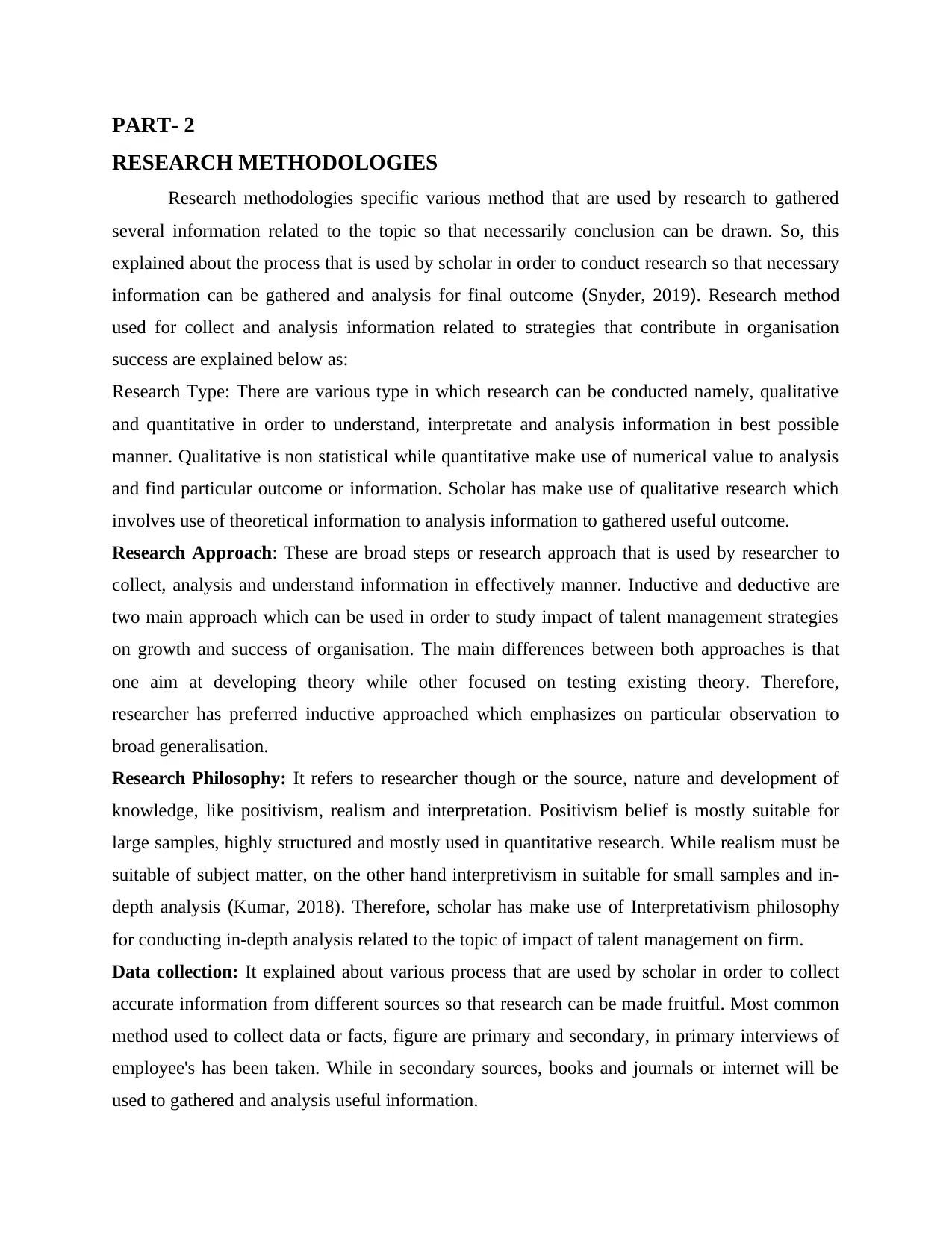
PART- 2
RESEARCH METHODOLOGIES
Research methodologies specific various method that are used by research to gathered
several information related to the topic so that necessarily conclusion can be drawn. So, this
explained about the process that is used by scholar in order to conduct research so that necessary
information can be gathered and analysis for final outcome (Snyder, 2019). Research method
used for collect and analysis information related to strategies that contribute in organisation
success are explained below as:
Research Type: There are various type in which research can be conducted namely, qualitative
and quantitative in order to understand, interpretate and analysis information in best possible
manner. Qualitative is non statistical while quantitative make use of numerical value to analysis
and find particular outcome or information. Scholar has make use of qualitative research which
involves use of theoretical information to analysis information to gathered useful outcome.
Research Approach: These are broad steps or research approach that is used by researcher to
collect, analysis and understand information in effectively manner. Inductive and deductive are
two main approach which can be used in order to study impact of talent management strategies
on growth and success of organisation. The main differences between both approaches is that
one aim at developing theory while other focused on testing existing theory. Therefore,
researcher has preferred inductive approached which emphasizes on particular observation to
broad generalisation.
Research Philosophy: It refers to researcher though or the source, nature and development of
knowledge, like positivism, realism and interpretation. Positivism belief is mostly suitable for
large samples, highly structured and mostly used in quantitative research. While realism must be
suitable of subject matter, on the other hand interpretivism in suitable for small samples and in-
depth analysis (Kumar, 2018). Therefore, scholar has make use of Interpretativism philosophy
for conducting in-depth analysis related to the topic of impact of talent management on firm.
Data collection: It explained about various process that are used by scholar in order to collect
accurate information from different sources so that research can be made fruitful. Most common
method used to collect data or facts, figure are primary and secondary, in primary interviews of
employee's has been taken. While in secondary sources, books and journals or internet will be
used to gathered and analysis useful information.
RESEARCH METHODOLOGIES
Research methodologies specific various method that are used by research to gathered
several information related to the topic so that necessarily conclusion can be drawn. So, this
explained about the process that is used by scholar in order to conduct research so that necessary
information can be gathered and analysis for final outcome (Snyder, 2019). Research method
used for collect and analysis information related to strategies that contribute in organisation
success are explained below as:
Research Type: There are various type in which research can be conducted namely, qualitative
and quantitative in order to understand, interpretate and analysis information in best possible
manner. Qualitative is non statistical while quantitative make use of numerical value to analysis
and find particular outcome or information. Scholar has make use of qualitative research which
involves use of theoretical information to analysis information to gathered useful outcome.
Research Approach: These are broad steps or research approach that is used by researcher to
collect, analysis and understand information in effectively manner. Inductive and deductive are
two main approach which can be used in order to study impact of talent management strategies
on growth and success of organisation. The main differences between both approaches is that
one aim at developing theory while other focused on testing existing theory. Therefore,
researcher has preferred inductive approached which emphasizes on particular observation to
broad generalisation.
Research Philosophy: It refers to researcher though or the source, nature and development of
knowledge, like positivism, realism and interpretation. Positivism belief is mostly suitable for
large samples, highly structured and mostly used in quantitative research. While realism must be
suitable of subject matter, on the other hand interpretivism in suitable for small samples and in-
depth analysis (Kumar, 2018). Therefore, scholar has make use of Interpretativism philosophy
for conducting in-depth analysis related to the topic of impact of talent management on firm.
Data collection: It explained about various process that are used by scholar in order to collect
accurate information from different sources so that research can be made fruitful. Most common
method used to collect data or facts, figure are primary and secondary, in primary interviews of
employee's has been taken. While in secondary sources, books and journals or internet will be
used to gathered and analysis useful information.
Paraphrase This Document
Need a fresh take? Get an instant paraphrase of this document with our AI Paraphraser
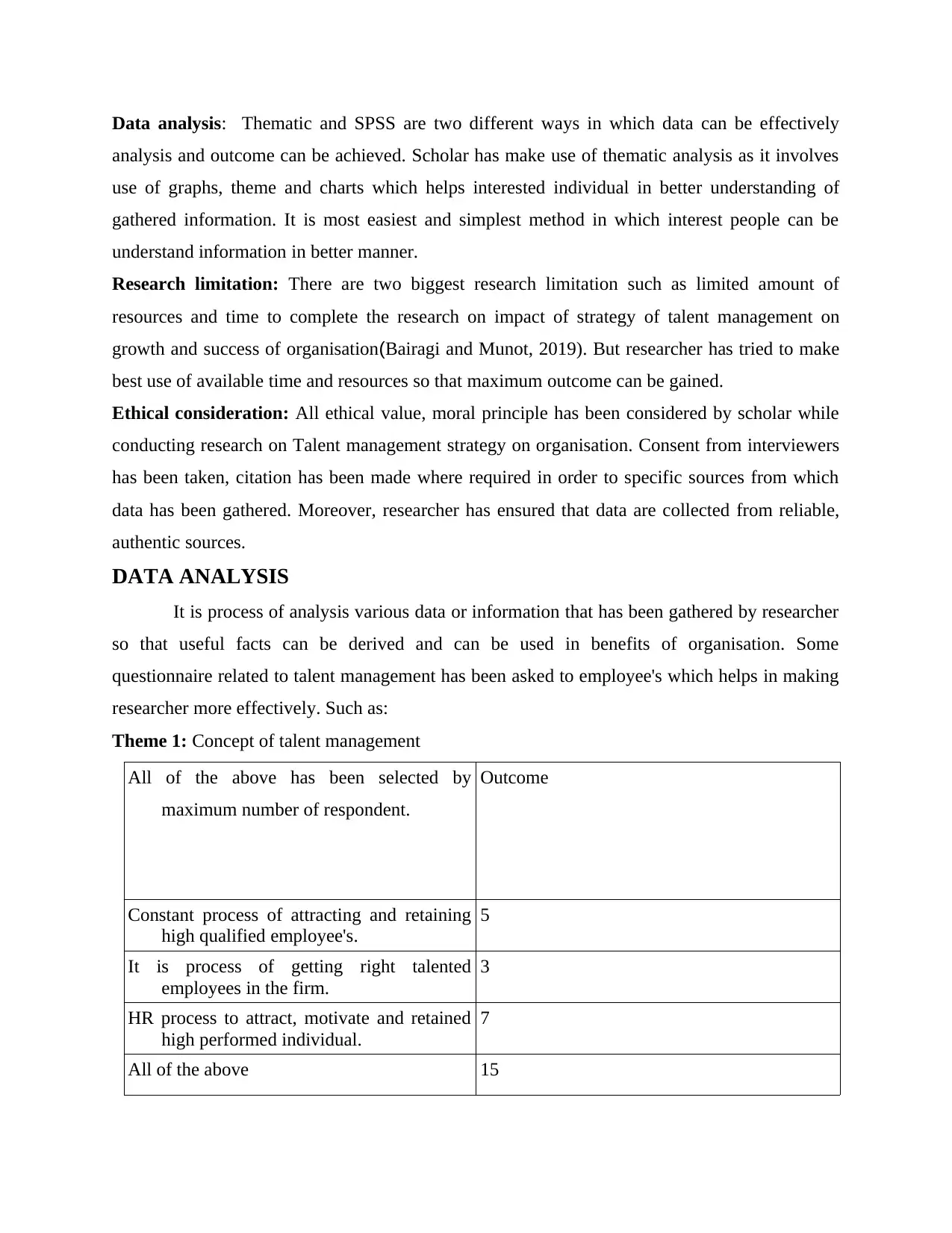
Data analysis: Thematic and SPSS are two different ways in which data can be effectively
analysis and outcome can be achieved. Scholar has make use of thematic analysis as it involves
use of graphs, theme and charts which helps interested individual in better understanding of
gathered information. It is most easiest and simplest method in which interest people can be
understand information in better manner.
Research limitation: There are two biggest research limitation such as limited amount of
resources and time to complete the research on impact of strategy of talent management on
growth and success of organisation(Bairagi and Munot, 2019). But researcher has tried to make
best use of available time and resources so that maximum outcome can be gained.
Ethical consideration: All ethical value, moral principle has been considered by scholar while
conducting research on Talent management strategy on organisation. Consent from interviewers
has been taken, citation has been made where required in order to specific sources from which
data has been gathered. Moreover, researcher has ensured that data are collected from reliable,
authentic sources.
DATA ANALYSIS
It is process of analysis various data or information that has been gathered by researcher
so that useful facts can be derived and can be used in benefits of organisation. Some
questionnaire related to talent management has been asked to employee's which helps in making
researcher more effectively. Such as:
Theme 1: Concept of talent management
All of the above has been selected by
maximum number of respondent.
Outcome
Constant process of attracting and retaining
high qualified employee's.
5
It is process of getting right talented
employees in the firm.
3
HR process to attract, motivate and retained
high performed individual.
7
All of the above 15
analysis and outcome can be achieved. Scholar has make use of thematic analysis as it involves
use of graphs, theme and charts which helps interested individual in better understanding of
gathered information. It is most easiest and simplest method in which interest people can be
understand information in better manner.
Research limitation: There are two biggest research limitation such as limited amount of
resources and time to complete the research on impact of strategy of talent management on
growth and success of organisation(Bairagi and Munot, 2019). But researcher has tried to make
best use of available time and resources so that maximum outcome can be gained.
Ethical consideration: All ethical value, moral principle has been considered by scholar while
conducting research on Talent management strategy on organisation. Consent from interviewers
has been taken, citation has been made where required in order to specific sources from which
data has been gathered. Moreover, researcher has ensured that data are collected from reliable,
authentic sources.
DATA ANALYSIS
It is process of analysis various data or information that has been gathered by researcher
so that useful facts can be derived and can be used in benefits of organisation. Some
questionnaire related to talent management has been asked to employee's which helps in making
researcher more effectively. Such as:
Theme 1: Concept of talent management
All of the above has been selected by
maximum number of respondent.
Outcome
Constant process of attracting and retaining
high qualified employee's.
5
It is process of getting right talented
employees in the firm.
3
HR process to attract, motivate and retained
high performed individual.
7
All of the above 15
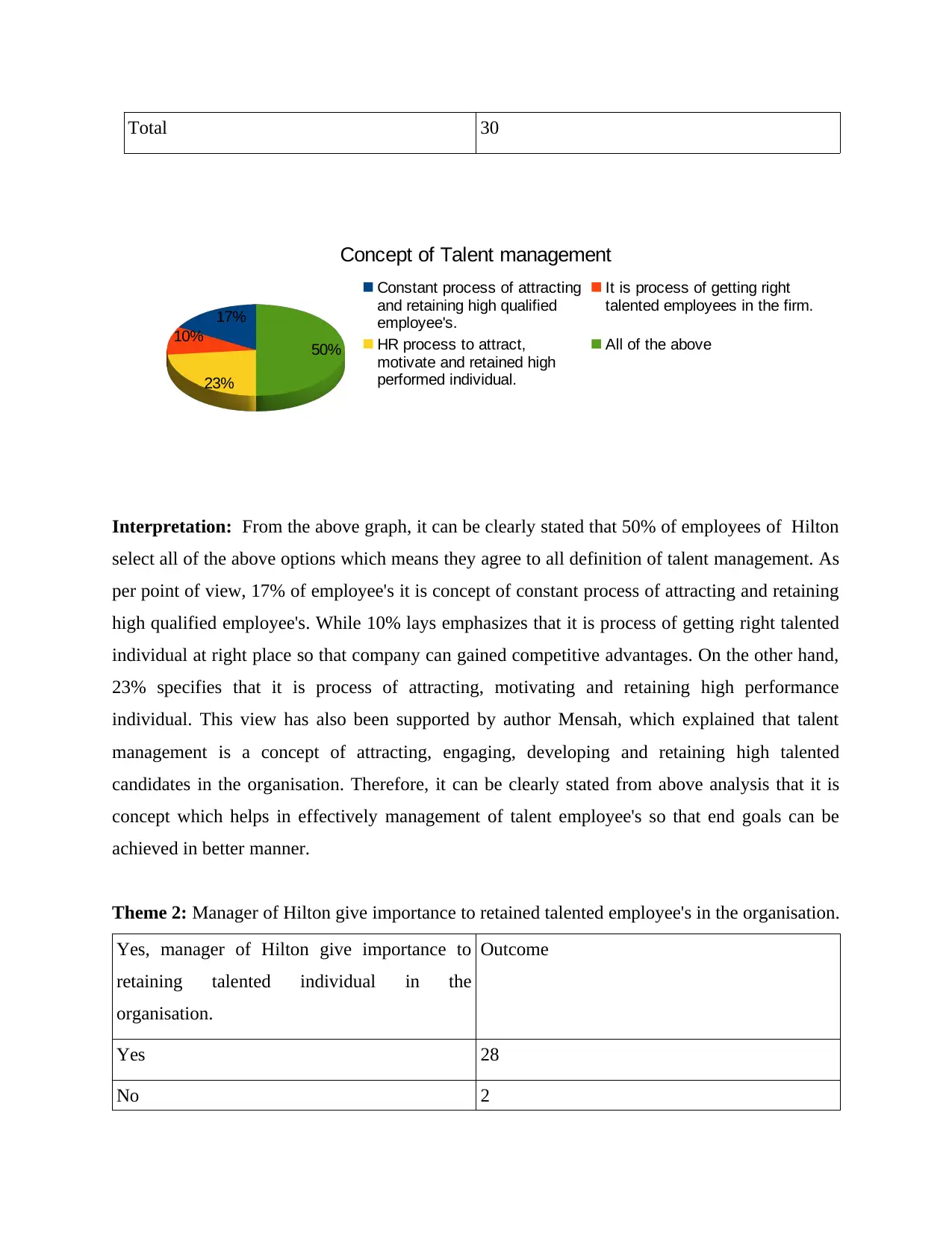
Total 30
Interpretation: From the above graph, it can be clearly stated that 50% of employees of Hilton
select all of the above options which means they agree to all definition of talent management. As
per point of view, 17% of employee's it is concept of constant process of attracting and retaining
high qualified employee's. While 10% lays emphasizes that it is process of getting right talented
individual at right place so that company can gained competitive advantages. On the other hand,
23% specifies that it is process of attracting, motivating and retaining high performance
individual. This view has also been supported by author Mensah, which explained that talent
management is a concept of attracting, engaging, developing and retaining high talented
candidates in the organisation. Therefore, it can be clearly stated from above analysis that it is
concept which helps in effectively management of talent employee's so that end goals can be
achieved in better manner.
Theme 2: Manager of Hilton give importance to retained talented employee's in the organisation.
Yes, manager of Hilton give importance to
retaining talented individual in the
organisation.
Outcome
Yes 28
No 2
17%
10%
23%
50%
Concept of Talent management
Constant process of attracting
and retaining high qualified
employee's.
It is process of getting right
talented employees in the firm.
HR process to attract,
motivate and retained high
performed individual.
All of the above
Interpretation: From the above graph, it can be clearly stated that 50% of employees of Hilton
select all of the above options which means they agree to all definition of talent management. As
per point of view, 17% of employee's it is concept of constant process of attracting and retaining
high qualified employee's. While 10% lays emphasizes that it is process of getting right talented
individual at right place so that company can gained competitive advantages. On the other hand,
23% specifies that it is process of attracting, motivating and retaining high performance
individual. This view has also been supported by author Mensah, which explained that talent
management is a concept of attracting, engaging, developing and retaining high talented
candidates in the organisation. Therefore, it can be clearly stated from above analysis that it is
concept which helps in effectively management of talent employee's so that end goals can be
achieved in better manner.
Theme 2: Manager of Hilton give importance to retained talented employee's in the organisation.
Yes, manager of Hilton give importance to
retaining talented individual in the
organisation.
Outcome
Yes 28
No 2
17%
10%
23%
50%
Concept of Talent management
Constant process of attracting
and retaining high qualified
employee's.
It is process of getting right
talented employees in the firm.
HR process to attract,
motivate and retained high
performed individual.
All of the above
⊘ This is a preview!⊘
Do you want full access?
Subscribe today to unlock all pages.

Trusted by 1+ million students worldwide
1 out of 37
Related Documents
Your All-in-One AI-Powered Toolkit for Academic Success.
+13062052269
info@desklib.com
Available 24*7 on WhatsApp / Email
![[object Object]](/_next/static/media/star-bottom.7253800d.svg)
Unlock your academic potential
Copyright © 2020–2026 A2Z Services. All Rights Reserved. Developed and managed by ZUCOL.





